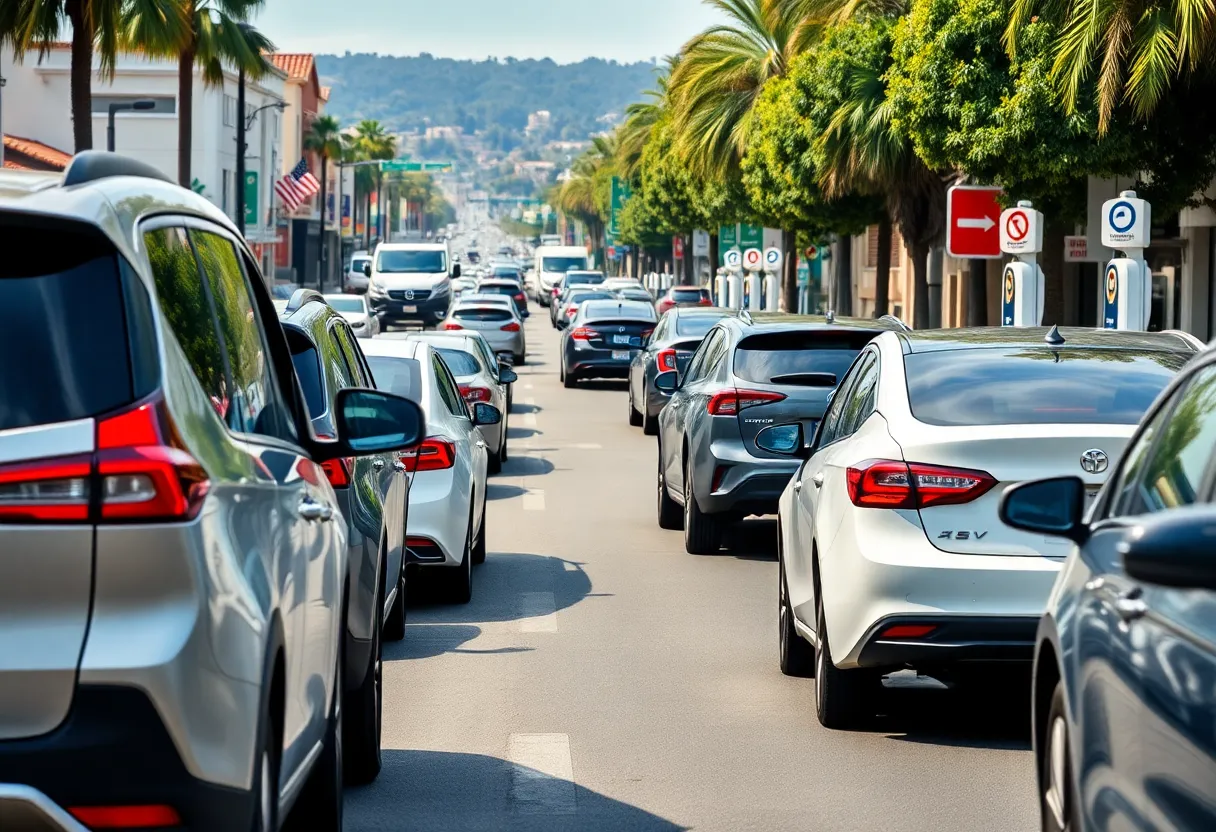News Summary
California is at the forefront of a Senate debate on stricter vehicle emissions standards, including a proposal to phase out new gas-powered vehicle sales by 2035. Senate Majority Leader John Thune announced upcoming votes aimed at blocking these regulations, which opponents argue could lead to a national electric vehicle mandate. Supporters emphasize the need for such measures to combat climate change and improve air quality. As tensions rise, the outcome could significantly impact California’s ambitious environmental goals and the future of electric vehicle adoption across the nation.
California is at the center of a heated debate in the U.S. Senate as lawmakers prepare to vote this week on resolutions aimed at blocking the state’s stricter vehicle emissions standards. Among these proposed rules is a ground-breaking plan to phase out the sale of new gas-powered vehicles by 2035. Senate Majority Leader John Thune, representing South Dakota, announced the voting consideration, indicating that final decisions are expected shortly.
Key votes will address House-passed resolutions seeking to roll back California’s emissions regulations. The Senate Parliamentarian and the U.S. Government Accountability Office have concluded that California’s policies do not fall under the Congressional review mechanism being utilized by Senate Republicans, which could complicate efforts to overturn the state’s ambitious emissions goals.
Opponents within the Senate, particularly Republicans, argue that California’s regulations would effectively impose a national electric vehicle mandate. They describe these rules as an improper expansion of the Clean Air Act, warning that they could destabilize the economy, disrupt consumer choices, and threaten energy supply.
Historically, California has been granted authority to set stricter emissions standards than federal regulations, owing to the severe air quality challenges the state faces. In 2020, Governor Gavin Newsom unveiled a plan to ban the sale of new gas-powered cars by 2035, aiming to significantly cut down transportation emissions. Automakers are compelled to increase their sales of zero-emission vehicles, with targets of 43% by 2027, 68% by 2030, and a complete transition to zero-emission vehicle sales by 2035. Notably, used gas-powered vehicles and alternatives such as plug-in hybrids and hydrogen-powered cars will still be available for consumers beyond the stipulated deadlines.
These Senate measures come on the heels of the previous administration’s revocation of California’s enforcement authority regarding emissions standards. This authority was later reinstated under the Biden administration, allowing the state to continue its more stringent regulations. Currently, more than a dozen states have adopted California’s emissions policies, although some, like Vermont, have paused their enforcement efforts.
Democratic senators are pushing back against the Republican initiatives, raising concerns about the parliamentary process and potential effects on future legislative measures. Senate Minority Leader Chuck Schumer has criticized the methods being used for these votes, noting that they may set a contentious precedent.
Amidst this ongoing legislative battle, questions loom about whether California’s electric grid can adequately support the anticipated increase in electric vehicle usage. Despite these concerns, California is steadfast in its pursuit of net-zero greenhouse gas emissions by 2045 and is actively enhancing its electric vehicle charging infrastructure. Recent data highlights that California leads the nation in electric vehicle registrations, illustrating a growing commitment from residents to transition to electric vehicles.
Federal tax credits are available for electric vehicle purchases; however, proposed Republican legislation may threaten these incentives. Uber has expressed doubts about meeting its own electric vehicle targets due to rising EV costs and fluctuating governmental support for eco-friendly policies.
Furthermore, initiatives like the curbside charging program in San Francisco aim to improve accessibility for electric vehicle ownership among residents, particularly those living in apartments without direct access to charging stations. The pilot program, initiated by the company it’s electric, has started with charging units on Fillmore Street. The public charging rates currently range from $1 to $5 per hour, providing essential resources for urban electric vehicle owners.
California’s ambitious climate strategy also includes goals to ensure that 25% of all private vehicles are electric by 2030 and achieving a complete transition by 2040. Attaining these targets will necessitate a substantial expansion of public charging stations across the state to accommodate the growing electric vehicle market. As the Senate prepares to vote on measures that could reshape California’s approach to emissions and vehicle sales, the discussion highlights the ongoing national debate over air quality regulations and America’s energy future.
Deeper Dive: News & Info About This Topic
- San Francisco Chronicle: Electric Car Cost in California
- Wikipedia: Electric Vehicle
- AP News: Senate to Vote on California Electric Car Standards
- Google Search: California Electric Vehicle Laws
- NBC Bay Area: EV Charging Program in San Francisco
- Google Scholar: California Emissions Standards
- CBS News: Curbside EV Chargers in San Francisco
- Encyclopedia Britannica: Electric Vehicle
- Axios: Electric Vehicle Adoption in SF
- Google News: California Gas Powered Vehicle Ban

Author: STAFF HERE HUNTINGTON BEACH
The Huntington Beach Staff Writer represents the experienced team at HEREHuntingtonBeach.com, your go-to source for actionable local news and information in Huntington Beach, Orange County, and beyond. Specializing in "news you can use," we cover essential topics like product reviews for personal and business needs, local business directories, politics, real estate trends, neighborhood insights, and state news affecting the area—with deep expertise drawn from years of dedicated reporting and strong community input, including local press releases and business updates. We deliver top reporting on high-value events such as the Huntington Beach Surf City USA Marathon, the U.S. Open of Surfing, Fourth of July celebrations at the Huntington Beach Pier, and community festivals at Huntington Beach Central Park. Our coverage extends to key organizations like the Huntington Beach Chamber of Commerce and Visit Huntington Beach, plus leading businesses in retail, hospitality, and outdoor recreation that drive the local economy. As part of the broader HERE network, including HEREAnaheim.com, HERECostaMesa.com, HERESantaAna.com, and HERELosAngeles.com, we provide comprehensive, credible insights into Southern California's dynamic landscape.





